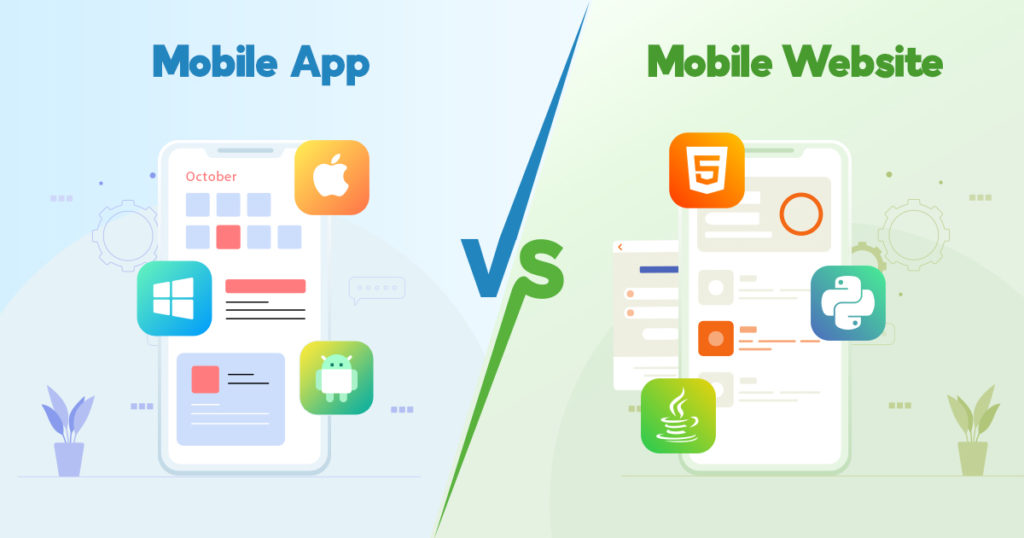Having a digital presence has become one of the intrinsic features of any marketing strategy that a business – irrespective of its size – needs to build on. In modern times, the number of people using smartphones and devices is more than 7 billion worldwide, making up almost 92% of the world population. With mobile phones becoming such an integral part of our lives, they make for the biggest platform to access any target audience. Research suggests that advertisers spend more than 50% of the total digital marketing budget on mobile advertising. This percentage is slotted to increase further in 2022. In such a scenario, start-ups require to build upon the mobile platform, to begin with. Here arises a question of what solution is better suited – mobile apps/mobile websites.
Best Suited for Start-ups – Mobile Application or Mobile Website?
For start-ups especially, gaining their customer’s trust is essential for increasing the conversion rates. The modern consumer is quite smart and research-oriented. Before investing in any product, consumers ensure to do a thorough background check by checking product websites and catalogs if any. In such a scenario, investing in a mobile website/mobile app is an essential step for a start-up willing to establish its brand image. However, developing a mobile app or application always costs a lot more than developing a mobile website. Hence the dilemma arises concerning a better solution for your business.
Understanding Mobile Application
A mobile application is a native application built for a mobile device. This device can work with or without access to the internet. These mobile applications are built specifically for the mobile platforms they will be used on – that is, separate applications for iOS and Android platforms. The users require to download these mobile apps through app stores before being used.
Benefits of Mobile Application
- Inbuilt features for better user experience
- Interaction with other mobile device features
- Provides immersive user experience
Understanding Mobile Website
Built using HTML5 pages, this is like a standard website but the one that scales down to fit the screen on a mobile device. Mobile Websites require internet access to connect through a web browser to showcase their content. These websites are designed specifically to suit the features of a mobile device.
Benefits of Mobile Website
- No platform-specific application required
- No need to update the installation
- No need for any software downloads to get access to content
Factors that influence the choice
Here is a checklist you need to browse through before making the final choice to choosing between a mobile app and a mobile website. This checklist will help identify the requirements of your product and the users, thereby enabling you to make the right decision based on the factors listed below.
- User Preference – First and foremost, understand what your consumers need. If your target audience is more of the type that requires accessing your product on the go, then developing a mobile app will be a better choice. However, if your consumers prefer careful browsing through the product catalog, and taking their time to decide, a simple mobile responsive website would suffice. These days, mobile websites can utilize complex functions within their scope of functioning.
- The Financials – As also mentioned earlier, developing mobile websites is more economical (read: cheaper) than developing mobile applications. When developing mobile applications, you need to develop separate apps for separate Operating Systems. Distinct apps will have to be created for the android and iOS platforms. For this reason, the cost of mobile app development is higher than those of developing mobile websites. Mobile Websites, since they are browser-based, require web developers to code only once as this code can function on all OS alike. Another reason mobile applications are costlier than a mobile website is the additional cost of updates development.
- Usage type – A mobile application is considered a success only when and if its users use the mobile app frequently. Most eCommerce applications such as Amazon, Flipkart, etc are a success due to the relative frequency of usage by individual customers. Further, mobile applications like Google maps, Swiggy, Uber, etc are also doing supremely well due to their usage frequency. For businesses where your product is a one-time buy or not frequently brought, as is the case with most start-ups, developing a mobile website would be the best strategy.
- Product complexity – The key decision-making point is your product. When your product offers features, and experiences that are complex, and cannot be fabricated with the mobile website, a mobile app is your solution. For instance, if you are simply offering glasses and sunglasses to your customers, a mobile website with app-like features would do it very well for you. However, if you also add to your product by providing users with features of trying on the glasses or the model selected (virtually, of course) using phone features such as a frontal camera, then a mobile application would do a better job than a mobile website. Depending on how complex your product is and the number of features you want to offer your customers to stand out from the competition, you can choose between a mobile app or a mobile website.
- Need to use phone’s features – Some products require using certain features of the smartphones for proper functioning, or product delivery. For instance, Google Maps requires constant location tracking to function, and showcase product features such as distance, the time required to reach your destination, road blockades, traffic situation, etc. Another example of the same would be where AR or Augmented Reality is used to help the user make decisions regarding the purchase of the product. IKEA, for example, provides users with the option to view the specific corners of their house by placing the product they are interested in virtually by using the smartphone’s camera. It gives the users a rough idea about how that particular space will look with the piece of furniture they are interested in buying, thus, enabling better decision making. The point is, for products that require access to the phone’s features for better product delivery and user experience, a mobile app is a better choice. Nonetheless, with technology advancing each day, certain advanced features can be included in mobile websites to enhance the end-user experience.
- Need for Updating – While developing mobile applications, you need to keep in mind that mobile applications require constant updates to keep up with the software changes of mobile devices. Different mobile apps need to be developed for various OS systems, mainly iOS and Android. So the costs of developing separate apps, plus the cost of updating these, should be calculated beforehand to save you from surprise costs mounting up later. Secondly, updating the mobile apps constantly also means that the users will also require to update these apps on their devices, proving to be a hassle. Therefore, if your product can do well without a mobile application, it is better to opt for a mobile website. A mobile website can be regularly updated within the scope of the browser, and users do not need to worry about these updates. No separate update development for different OSs is required for mobile websites since these are operated via a web browser. Overall, when it comes to hassle-free operation, mobile websites are better than mobile applications.
- App speed – The speed of the content being loaded is also a big considering factor when deciding between a mobile app and a website. For certain products such as games, a downloadable mobile application works better than a mobile website offering an online gaming experience. The reason for the same is the speed at which these games function. Certain games require large data transmission for the best animation and other gaming features to provide users with an immersive experience. For such games, developing an app-based product is a better option compared to a browser-based product since the speeds of a mobile app will be faster than the speed of a game operating through the web browser (if both games have the same features, animations, and data usage).
- Offline or Online – Depending on the kind of product you are offering; you can analyze if your product can be accessed offline or requires constant internet connectivity. In cases where internet connectivity is a must, a mobile website can work equally well as a mobile application. The benefit of mobile applications is that they can function without the internet if you choose this. One of the examples of a successful mobile application using the offline mode feature is Google Maps. With an offline mode, Google Maps is one of the most trusted mobile applications for users who fear the loss of internet connectivity on their travels. Google Maps can be downloaded and operated in an offline mode, as it downloads the maps and terrain onto the phone to use and can function without the internet. Amazon Kindle is another brilliant application that has revolutionized the way the world reads. Providing the users with access to books offline (of course, you have to download the books beforehand when you have internet connectivity), Kindle has reduced the weight of the books people would carry during travel. You can read multiple books on your smartphone, even when there is no internet. Netflix has a feature where you can download the movies or serials you want to watch offline. If you have a similar product that can function in an offline mode, then mobile app development is the best thing you can do for your business.
- Ease of use – Research indicates that 57% of the users do not trust businesses with poorly developed websites or applications. 8 out of 10 users responded that they would rather not interact with content or media that does not open well on their devices. Therefore, the ease of using the content you make available for the customers should be one of the key points of interest. Further, mobile websites are more approachable than mobile applications since no downloads are required.
- Competitor’s choice – Understanding the branding and marketing strategy of your competitors can also be a deciding factor when it comes to choosing between mobile apps/mobile websites. If your competitor is doing well on a mobile application platform, it is advisable to go for the same and vice versa.
Finally, the guru speaks.
It suffices to conclude that for most standalone start-up businesses dealing with eCommerce, a mobile website works as well as a mobile application. Having a mobile website is an absolute must for start-ups. Mobile websites provide users with a complete and wholesome experience while also providing added benefits for the businesses, such as lower development and maintenance costs. That said, mobile applications cannot be ruled out altogether. The kind of immersive experience provided by mobile apps is unique in itself. By using mobile phone features such as a camera, mobile applications can help provide users with a mesmerizing experience. Therefore, choosing between a mobile website/mobile app depends explicitly on your product.
When in Doubt…
When choosing between the two becomes difficult, select the option to develop PWA or Progressive Web Applications. These mobile applications are developed and meant to function within a web browser. So, the PWAs are essentially a combination of a mobile website and a mobile application. PWAs are being preferred by most start-up businesses these days because they provide added features like mobile applications while providing the ease of maintaining and developing these like the mobile website.
Follow and like us on LinkedIn,Twitter and Facebook &Instagram.





Comments are closed.